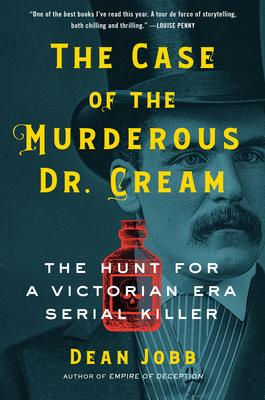Anyone who has found comfort in binging true crime podcasts and documentaries will feel at home diving into Dean Jobb’s latest work, “The Case of the Murderous Dr. Cream.” Jobb demonstrates nothing short of expertise in his research and intricate detail in presenting the horrifying true story of Dr. Thomas Neill Cream.
Born in Glasgow in 1850 and raised in Quebec, Cream would eventually declare his desire to become a doctor, leaving his family and reputation as a kind, hardworking young man of strong moral character to attend medical school at McGill University in Montreal.
Entering medical school was a cultural shift for the humble, aspiring doctor. At that time, cadavers used for surgical practice were not secured through legal (or ethical) means. This also was the first time Cream had been away from his family, and he developed a penchant for extravagant living.
The traces of the once bright, promising young doctor became more difficult to see as he advanced in his studies, an arrogant Dr. Cream emerging. Between completing his program at McGill and traveling to London for his post graduate studies, Cream would court, impregnate and nearly kill his fiancé Flora with a botched abortion before marrying her at her father’s demand. Leaving promptly for England after the wedding, Cream never saw his bride alive again. A sudden illness befell Flora the next year and by the time she revealed that she had been taking medicine her doctor-husband had sent to her it was too late.
Cream’s boldness only intensified as he finished his studies in Europe and returned to Canada to begin his career. From his practice in Ontario, and then on to Chicago, Cream poisoned people along the way. He made several attempts to blackmail pharmacists and businessmen but eventually his ego caught up with him. After conspiring to murder the husband of his mistress by strychnine—claiming that he was simply treating his condition and that the pharmacist was to blame for the lethal dose—Cream was found guilty of murder and sentenced to life in prison.
His time, alas, would not be served. His sentence was commuted in under 10 years, allegedly due to bribery. This failed attempt at justice emboldened Cream and catapulted him back across the ocean to London and the district of Lambeth where his incarceration, and previous heinous acts would fester, his killing spree resuming as if it never stopped. Less than a year after landing in Lambeth, the murderous Dr. Cream, “The Lambeth Poisoner” was arrested and convicted for the murders of five of his most recent victims. He was sentenced to death.
Cream was arguably the worst kind of killer, perhaps not as gruesome as Jack the Ripper (despite serving time in Joliet prison during Ripper’s reign of terror, suspicion arising that they were, in fact, one and the same), but he gained the trust of his victims before discarding them like garbage, preying on the vulnerable and capitalizing on the power his vocation provided him.
Despite the terrible acts committed by this madman, Jobb has compiled them into a spellbinding volume in the greater canon of true crime, at once captivating and horrifying, as difficult to put down and easy to swallow as a gelatin capsule of strychnine from the Murderous Dr. Cream.

.png)


Comments